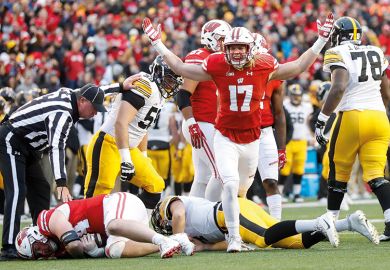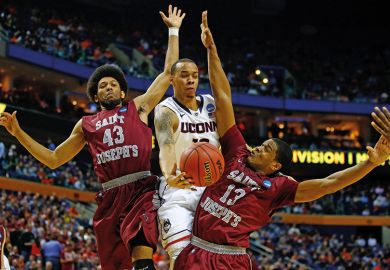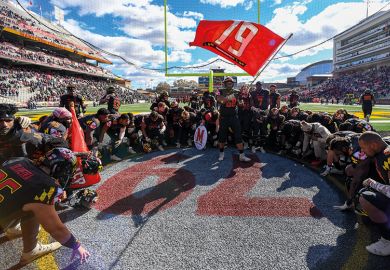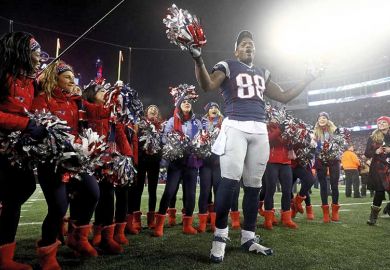The state of California has defied its universities by allowing their student athletes to sign commercial endorsement contracts in a bid for economic and racial equity that threatens cascading effects nationwide.
California’s governor, Gavin Newsom, signed a bill legalising such payments to students despite promises of lawsuits and warnings from the nation’s governing body of university sports, the National Collegiate Athletic Association, that it would evict the state’s colleges from its leagues.
The measure was strongly backed, however, by advocates of the student athletes, who contend that US colleges are taking millions of dollars in revenue that should rightfully go to the players – especially non-white stars in major sports such as football and basketball.
Either way, the law does not take effect until 2023, giving all parties time to sort out their assessments and positions, and, potentially, allowing other states to join California and, in effect, make the change inevitable.
California’s move, if adopted nationwide, raises “significant implications for big-time college athletics”, said Robert Kelchen, associate professor of education leadership, management and policy at Seton Hall University in New Jersey.
Even the NCAA, which has fought the California bill, is not necessarily convinced that it will be harmed by a nationwide elimination of the ideal of student athletes as amateurs, much the way the Olympics abandoned the notion in the 1980s.
Instead, the NCAA has spent the past several months studying the idea of allowing student athletes to profit from their own marketing, and it has led its member universities in protesting against the California law largely on the grounds that any such change should be coordinated and implemented nationally.
But with the NCAA now collecting more than $1 billion (£800 million) in revenue annually, mostly from contracts with television networks that broadcast college sports, and with university coaches in major sports being paid millions of dollars apiece, advocates for students – some of whom say they struggle just to feed themselves – have demanded faster change.
Mr Newsom made that point by signing the measure – which was approved overwhelmingly by the state legislature – on a television programme hosted by LeBron James, the Los Angeles Lakers basketball star who has led other black athletes in lobbying for the law.
Mr James in 2003 took the rare step of joining the NBA without first playing in college, saying that he and his family could not afford to wait for the income he would receive from playing in a professional league. Such a move is now becoming more common, raising the prospect that the NCAA might ultimately welcome ways of making college more enticing for young premier athletes.
The change, however, could threaten another group that struggles in college sports: female athletes. Some women – including one of the bill’s authors, Nancy Skinner, a Democratic state senator from Berkeley – have argued that the right to profit from marketing during college is essential to female student athletes because so few of them will have professional opportunities.
But Dr Kelchen warned that colleges might cut athletic scholarships if students begin earning substantial outside income. And female athletes could then be disproportionately harmed, he said, because they are less likely to win major marketing contracts and are currently protected by a federal law requiring gender balance in athletic scholarships.
The change, he said, is also unlikely to slow a major and persistent area of sports-related inequity in higher education, involving athletes at elite colleges. That is because top-ranked institutions such as those belonging to the Ivy League offer their athletes highly valuable admissions preferences rather than scholarships.
Large numbers of those scholarships are typically awarded in less prominent sports such as lacrosse and tennis, where the players are disproportionately white and affluent.
The University of California system, in a statement of response to the new state law allowing student athlete marketing, reiterated the NCAA’s warnings that it could not allow one state’s college sports teams to enjoy such a large competitive advantage over those of other states.
But Mr Newsom, who earned a baseball scholarship to Santa Clara University, said his state – which is big enough to rank as the world’s fifth-largest economy – was too powerful for the NCAA to risk alienating at a time when other states could consider similar moves.
“They can’t afford to lose the state of California,” the governor said in a conference call with reporters.
Register to continue
Why register?
- Registration is free and only takes a moment
- Once registered, you can read 3 articles a month
- Sign up for our newsletter
Subscribe
Or subscribe for unlimited access to:
- Unlimited access to news, views, insights & reviews
- Digital editions
- Digital access to THE’s university and college rankings analysis
Already registered or a current subscriber?








